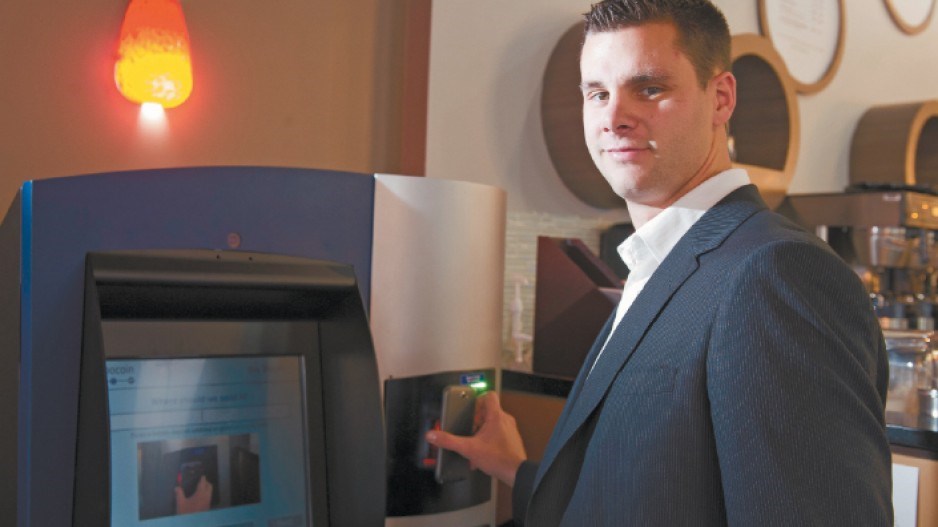Waves Coffee House on Powell Street has traditionally been a meetup for ESL students, many of whom happen to be Bitcoin enthusiasts.
In August, Judy Fujiki, the owner, agreed to let Waves become a meetup for Vancouver Bitcoin promoters, who helped her set up a merchant's account.
As a currency, Bitcoin has been slow to catch on. Fujiki said only five to 10 customers per day use Bitcoin to make purchases at Waves. But as an investment, it's on fire. Last week, Bitcoins were selling for more than $700 each.
"I hope it's not just a fad," Fujiki said. "I have an innovative spirit. I want to see if maybe it will turn into something big, so I'm not converting any of my Bitcoin into cash. I'm just keeping them."
Fujiki set up a merchant's account with Bitpay, which provides the apps needed and charges a 1% transaction fee when Bitcoin is converted to dollars. (Merchants can also pay a flat $30 monthly subscription fee and pay no transaction fees.) She uses an iPad with a Bitcoin merchant's app, which facilitates wave-and-pay transactions. She types in the price for a coffee, including tax, and a QR code pops up on her tablet. The customer uses his or her smartphone to scan the code, and it debits the customer's account and credits Waves' account.
The Bitcoin Co-op, a Vancouver-based organization, helps merchants set up Bitcoin accounts and point-of-sales applications. Roughly 20 Vancouver merchants have set up accounts through the co-op.
At the end of August, the world's first Bitcoin ATM opened at Waves. In its first week, it did $100,000 worth of transactions, with more than 500 unique users registered – 90% of whom were buying – according to Bitcoiniacs, the Vancouver company that owns it. The one advantage of Bitcoin as a currency is that it avoids a lot of the transaction fees that credit card companies charge.
"If I were able to do everything in Bitcoin, I wouldn't be paying credit card fees," said Corey Judd, owner of Cabin 12 Restaurant in Victoria, which has been accepting Bitcoin for about six months. "That comes to $700 or $800 a month in debit fees and credit card fees."
But only two or three customers per week actually use Bitcoin at Judd's restaurant. The digital currency is appreciating so fast, people may be reluctant to use it as a currency for day-to-day transactions.
Its real value as a currency may be in international transactions because it is not subject to exchange rates or banking transaction fees, and it is much quicker than wire transfers. That might appeal to companies conducting business overseas, especially in China, which accounts for 50% of the world's Bitcoin transactions.
"Right now we do a lot of wire transfers to get money onto the exchanges and it takes three to five business days, and for $50,000 it costs us about $150," said Bitcoiniacs founder Mitchell Demeter. "That [length of time] is the equivalent of sending a letter in the mail back in the '90s."
Alix Resources Corp. (TSX-V:AIX), a Vancouver junior miner, is banking on Bitcoin as a legitimate currency and plans to get in on the game, first by paying contractors in Bitcoin and then by opening a new Bitcoin exchange.
"I think it's going to be more than a bubble, and that's why we want to do the exchange as well," said Alix Resources president Michael England. "We're not doing a change of business just yet. We're still a junior mining-exploration company. But down the road, we'll embrace a change of business, if this goes as well as I think it will."
Bitcoin is a decentralized “cryptocurrency” that’s not controlled by any bank or nation and is traded directly peer-to-peer. Regulars and financial institutions are still not sure what to make of it.
The BC Securities Commission does not regulate Bitcoin trading, and Canada’s currency regulator, FINTRAC (Financial Transactions and Reports Analysis Centre of Canada), has decided not to treat it as a currency.
Camilla Sutton, chief currency strategist for Scotiabank Global Banking and Markets, said Bitcoin may appeal to investors worried about currency devaluation.
There are close to 12 million Bitcoins in circulation, but they will be capped at 21 million, so it’s a currency that can’t be diluted, once it reaches that cap.
“If you are worried about monetary policies, like quantitative easing or bond buying in the U.S., it’s kind of more the gold story,” Sutton said. “If you want a currency that’s outside of all that, there’s appeal, to a certain segment, in a Bitcoin.”
But like any hot commodity, its value can go down as fast as it goes up. On April 9, it was selling for US$230 but dropped to US$68 on April 16.
“It’s important to highlight that there is tremendous risk in something that is moving that rapidly higher,” Sutton said. “That kind of volatility removes a whole store of value.”




